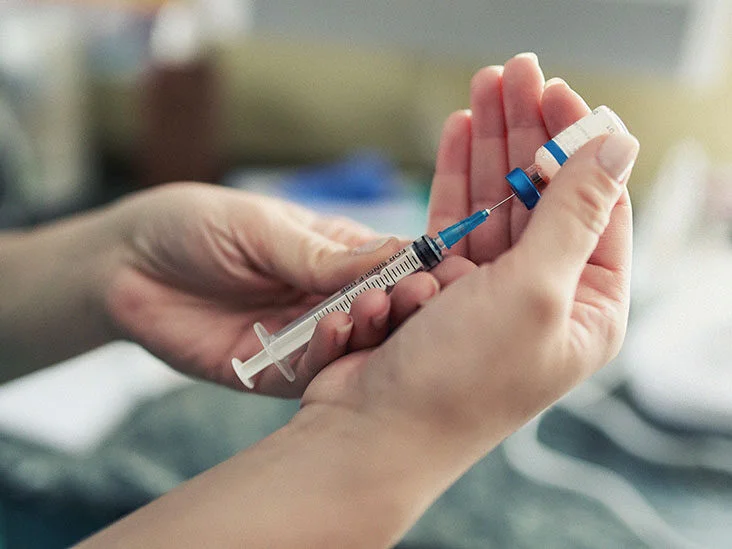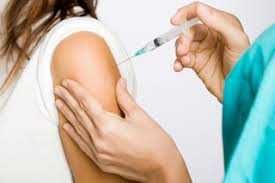Flu vaccine. The flu vaccine is the most effective prevention against seasonal flu, a respiratory disease caused by so-called flu viruses. How does the flu vaccine work? The flu vaccine used in Italy is called trivalent details because it contains three types of virus: two type A (H1N1 and H3N2) and one type B.
There is also a quadrivalent vaccine that contains two type A viruses (H1N1 and H3N2). and two type B viruses. The viruses contained in the vaccines are selected on the basis of viruses isolated during the previous season. Thus, the effectiveness of the vaccine depends on the match between the viruses it contains and the viruses in circulation, which may also be different.
What is the flu vaccine?
The vaccine is given by intramuscular injection: into the arm at the age of 9 years and older, in younger children into the anterolateral side of the thigh.
When to get a flu shot?
In our country, it is possible to receive the flu vaccine in the autumn, the vaccination campaign usually starts in mid-October and ends at the end of December.
This period was determined as the best, taking into account the Italian climatic conditions and the trend of influenza epidemics. Anyone who wishes and does not have exact contraindications can undergo vaccination.

Certain categories are considered to be particularly at risk and therefore the flu vaccine is suitable and offered free of charge.
Here are some examples: People over 65 years old.
Children (over 6 months), adolescents and adults (up to 65 years) affected by pathologies for which they could be exposed to the risk of serious complications in case of influenza (chronic diseases of the respiratory system, diseases of the cardiovascular system, tumors, metabolic diseases). Pregnant women who are in the second or third trimester of pregnancy at the beginning of the epidemic season.
Categories of workers such as police forces and firefighters
Category of workers in contact with animals, potential source of infection with viruses other than human influenza. Adverse effects of the flu vaccine.
The flu vaccine is safe because it goes through a series of checks before being distributed.
Local reactions such as redness, swelling and soreness may occur after the injection, as well as fever, headache, muscle or joint pain.

Rare events (such as thrombocytopenia, neuralgia, paraesthesia, neurological disorders and severe allergic reactions) have been reported temporarily after influenza vaccination, but a correlation between the vaccine and the onset of the disorders has not been established.
Correct information is the only key to spreading a “culture” of health that can contribute to the well-being of citizens and the prevention of diseases, especially communicable ones such as the seasonal flu, which, unfortunately, every year due to its complications, causes serious, sometimes even fatal, consequences.
Yesterday, AIFA CEO Mario Melazzini spoke about it, a guest on the Uno Mattina show, to provide a thematic insight into the benefits of the flu shot and its characteristics.
Vaccines approved for use in humans, including influenza vaccines, are safe biological products.
Their use in Europe is approved and regulated by the European Medicines Agency (EMA) and national regulatory authorities, in Italy it is AIFA. As with all medicines, the safety of influenza vaccines is ensured by a series of rigorous controls throughout their life cycle, both before they are placed on the market, during production and after they are placed on the market.
Influenza vaccination is therefore safe and strongly recommended for certain categories of people
These are specific groups considered to be at “high risk” of developing complications as a result of the disease.
These include, in particular, people over 65 years of age, children under two years of age, pregnant women, people with chronic recurrent diseases and those living in the community (hospitals, barracks, schools, nursing homes, etc.).

Unfortunately, even these subjects have not been sufficiently vaccinated in recent years. Last winter, for example, less than every second elderly person was vaccinated, when the recommended minimum vaccination coverage is 75%.
The vaccination campaign started already in mid-October and will continue until the end of December.
Regions and autonomous provinces establish structures responsible for vaccination in our country, and in addition to the vaccination services of the KNAV Prevention Department, it is also possible to contact general practitioners and pediatricians of your choice. The vaccination-induced boost lasts six to eight months and then declines.
It is therefore necessary to vaccinate at the beginning of each new flu season, also because the composition of the vaccine changes every year to adapt to the characteristics of the new virus.
This year, based on the recommendations of the World Health Organization and the European Medicines Agency, a new variant of the AH1N1 virus called Michigan was introduced.
The rest of the flu vaccine has the same composition as in 2016-2017
Vaccine-induced protection begins approximately two weeks after vaccination. The vaccines available in our country are inactivated, i.e. they do not contain the entire active virus particles and therefore cannot cause disease.
However, some side effects may be associated with influenza vaccination: their frequency depends on the type of vaccine, the method of administration and, of course, the age of the vaccinated person.
Vaccines given by injection into a muscle can cause common my reactions such as soreness and redness at the injection site and usually occur within the first few days after vaccination.
Less commonly, fever, muscle or joint pain, or headache may occur.
Generally, however, these are mild symptoms that appear within 6-12 hours after the vaccine is administered and that resolve within a few days with symptomatic treatment such as antipyretics or analgesics.
Rarely, allergic reactions such as urticaria, rapid swelling at the injection site, asthma or severe systemic (generalized) allergic reactions may occur in case of hypersensitivity to some components of the vaccine.
